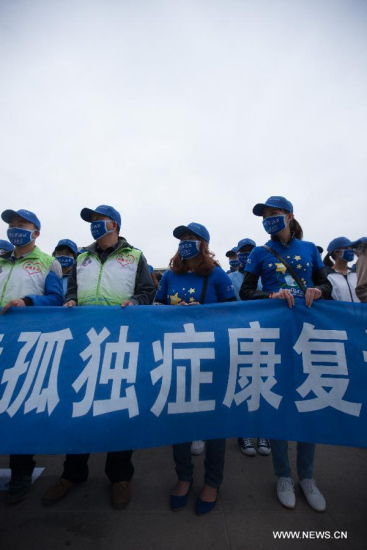

Volunteers participate in a rally marking the World Autism Awareness Day in Yinchuan, capital of northwest China's Ningxia Hui Autonomous Region, April 2, 2014. (Xinhua/Chen Junqing)
One minute, Xiao Man, 18, is meticulously drawing an earring, copying from a picture on his table. The next, humming loudly, he gets up from his chair and starts pounding on the table.
His autism makes his behavior unpredictable and severely curtails his linguistic ability, but after four years in an art therapy program, his teachers believe he has discovered an artistic language all his own.
World Autism Awareness Day on Wednesday has brought the kind of art therapy that lights up the -- often quite dark -- world of autistic children.
Xiao Man learned to paint at classes offered by the Beijing Golden Wings Art Rehabilitation Service Center for Disabled Children. At the center, six kids wearing aprons splattered with dried paint are copying from various pictures. Kang Kang is painting two spotty dogs sitting on green grass. Asked why he likes painting, he replies without raising his head, "I like painting doggy."
Kang Kang shakes hands with everyone he meets and introduces himself in a fairly clear voice. Cheng Cheng quietly draws a house with perfect proportions. Also a pianist, Cheng Cheng has performed several times with professional orchestras.
These kids are the fortunate ones. China is home to an estimated 1.6 million autistic people. Very few of them ever find things they enjoy doing and fewer still get access to art-rehab.
"Art is expensive. Autistic kids usually have one parent as a full-time carer and costs for families are high," says Zhang Junru, founder of Golden Wings.
Zhang, a veteran entrepreneur, has completely overhauled Golden Wings' funding. Art lessons are completely free, and revenue comes from from sales of the children's paintings. Twenty percent of the money received goes straight to the artists themselves, and Xiao Man now generates an annual income of several thousand yuan, according to his mother Yu Hua.
Just like any mother, for Yu the only thing that really matters is that her son has something he likes to do. Yu was forced to retire from her job as an accountant at the young age of 43 to care for her son. "I used to worry about him a lot as he had nothing to do but wander about," she says.
Yu recalls when her son was diagnosed. "At first, I could not accept what I was being told. I had no idea what would become of him. At that time in China, ordinary people knew very little about autism."
Little did she imagine that one day her son would be acclaimed as a naturally gifted artist.
"Xiao Man's drawings are always interesting. I guess he doesn't see the world in quite the same way as I do, but he has something unique inside him, something of great artistic value," said Peng Cheng, 27, a professional oil painter who volunteers at Golden Wings.
Zhang Junru knows social recognition is very important for autistic kids and their families, "recognition, rather than sympathy," she stresses.
There are now 48 kids in the Golden Wings program. A travelling gallery exhibits their work in shopping malls, office buildings and metros.
Peng recalls when a kid named Jin Feng had a painting, "A Tigress Wearing Lipstick" displayed in the gallery. His mother was so surprised she brought Jin Feng's grandmother along. "The mother and the granny could not stop having their pictures taken in front of the painting," Peng says: "Tears welled up in my eyes several times that day, when I saw the true meaning of my work. Prior to that, I thought I was just doing a job."
The painter discovered a deeper meaning to her two years at Golden Wings, when she found that painting could expand what kids know of the world. A 9-year-old student drew only the wheels of cars. Peng began teaching the boy to draw the whole car and to put his cars on the road.
"His grandmother said I was wasting my time because the boy didn't understand a thing, but I kept trying and one day he drew traffic lights without any prompting from me," Peng says.
Delighted with the fruits of her labors, Peng's emotions verged in the ecstatic when the grandmother told her that the boy had even learned to read traffic lights.
"I have to calm myself down after each class," Peng says. The challenge of teaching a class of autistic kids with no professional training drains her, physically and emotionally.
Peng spends half a day each week at the center. She reads up on autism after class, and believes wholeheartedly in the power of art therapy. She understands the magic of color.
As for the mothers, they only expect their kids to lead a colorful life and make whatever small progress they can each day.
Copyright ©1999-2018
Chinanews.com. All rights reserved.
Reproduction in whole or in part without permission is prohibited.